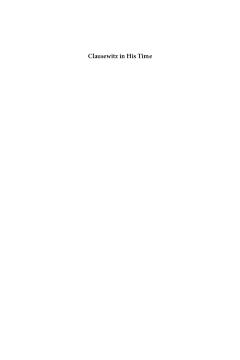
Additional Information
Book Details
Abstract
Anything but a detached theorist, Clausewitz was as fully engaged in the intellectual and cultural currents of his time as in its political and military conflicts. Late-eighteenth century thought helped shape the analytic methods he developed for the study of war. The essays in this volume follow his career in a complex military society, together with that of other students of war, both friends and rivals, providing a broad perspective that leads to significant documents so far unknown or ignored. They add to our understanding of Clausewitz’s early ideas and their expansion into a comprehensive theory that continues to challenge our thinking about war today.
Peter Paret is Professor emeritus of the Institute for Advanced Study. Among his works on military history and on European culture in the 18th to the 20th century are a biography, Clausewitz and the State, now in its fourth expanded edition, and the translation, with Michael Howard, of Clausewitz’s On War. He is a Fellow of the American Academy of Arts and Sciences, a member of the American Philosophical Society and recipient of its Thomas Jefferson Medal, an Honorary Fellow of the London School of Economics, and an Honorary Member of the German Clausewitz Society. The German government has awarded him the Grand Cross of the Order of Merit.
“…an enlightening addition to our ever-growing library of reflexions on Clausewitz’s legacy.” · The Journal of Military History
“Overall the essays published here reflect impressively the intensive occupation of the by now 91-years-old historian in the life and work of Carl von Clausewitz. Apart from the research carried out of the German historian Werner Hahlweg and the French sociologist Raymond Aron, it is Peter Paret’s work that has greatly enriched our knowledge of Clausewitz and his time.” · Militärgeschichtliche Zeitschrift
“Peter Paret has given us yet another fine addition to the literature on Clausewitz, as well as his era.” · Journal of Modern History
